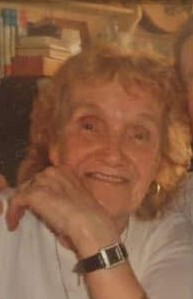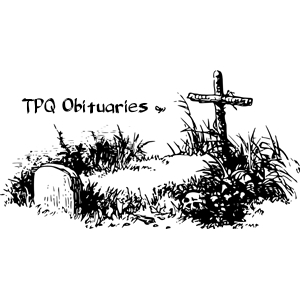 |
| Ellen McAllister |
When the McAllister family moved from the Markets to Belmore Street in the Lower Ormeau Road, it was a stroke of fortune for me. Quickly I became close friends with two of the sons and got to know the rest of the family pretty well including their mother, Ellen. Myself, Malachy McAllister and our friend Frankie Rea were inseparable and probably regarded ourselves as the three Musketeers while my mother reminded me that we looked more like the Three Stooges, teenage fashion chasers attired at times with our umbrellas, Oxford trousers and Crombie coats.
At times I felt I was in their home more often that I was in my own. Ellen was laid back and under her relaxed gaze we watched as much soccer as TV broadcast then, or simply chilled out as teenagers do watching top Of The Pops and keeping up with the latest in music. It was their living room where we danced and roared when the man dubbed the “Polish Clown” by Brian Clough behaved more like an acrobat in keeping out the England forwards at Wembley, “with arguably the most wonderfully eccentric goalkeeping display ever seen at the stadium.” It ultimately denied the English a place in the 1974 World Cup tournament in the then West Germany and seared the name Tomaszewski into my memory forever.
As teens we did all the things we were not supposed to do, drink cider in alleyways prior to the disco, riot with the British Army and fight with Tartan gangs. Handball was a summer activity which we played for hours every day, rushing down to Ellen’s for a drink of water, before resuming our position on the court – the stretch of road between two gable walls at the end of Belmore Street. Malachy, or Mock as we called him was good, but Rab was brilliant, time after time picking out the bottom brick in the wall, making a return impossible. He and I would also play squash and indoor soccer at San Souci Park gym on the Malone Road, courtesy of belonging to a local youth club. Our first port of call after the exertions was Ellen’s before making my way home a few hundred yards away.
Despite finding endless ways to satisfy our existential teenage need for excitement, the Lower Ormeau Road during the early 1970s was not a place where a parent could relax. The knowledge was certain that their children were easy pickings for loyalists on the hunt for Catholic victims. Scruff Millen, a member of the Official Republican Movement was the first to die at the hands of Loyalists at the corner of Belmore Street where Ellen lived, at the very spot where we tried out our handball skills. It must have served as a serious reminder to her and other mothers of just how dangerous it was to merely walk the streets.
They were mean streets and we were coming of age in them. When in March 1976 I stepped into the dock of Belfast petty sessions in a boiler suit and flanked by RUC men, Ellen was in the courtroom. It was the only friendly face there, so it was uplifting to see her, having spent the weekend staring at RUC detectives who grimaced back, as eager to break my silence as I was to maintain it. For me it was fortuitous that she was there - she happened to be down for another case and did not expect to see me swagger into the dock inflated with the arrogance of youth. She waved, I nodded.
Now I was facing a much more serious charge than I had the previous occasion she had seen me in court. Then it was in August 1973 when myself and one of her sons, Rab, appeared battered and bruised after being batoned and beaten by the British Army in the early hours during an anti-Internment bonfire and rally. I got it laid on thick while English accents triumphantly screamed that they had the bastard who had lit the bonfire and hoisted the tricolour on the derelict building at the corner of Lavinia Street. The cops took me to hospital for a check-up before accepting me from military custody. Rab got remanded to the Crum and I to St Patrick’s training home along with Noel McGuiness, whereas another relative of Ellen’s, Kathleen Callaghan, got dumped in Armagh.
That was the type of environment mothers like Ellen had to cope up while bringing up sons and daughters not prepared to take a kick from some armed squaddie and let it pass.
Despite that, she would chide me for cheering at the deaths of British soldiers or RUC when in her home. Her view, bad as they were they were the sons of someone who would have to bear the grief. Not the sort of thing a testosterone teenager pays much attention to. As Karl Marlantes reflects in his book,
Later, three of her sons would all be jailed and I ended up on wings or blocks with each of them. From the relaxed living room of Belmore Street to the cauldron of confinement that was Long Kesh, we had completed a journey we never conceived of prior to the arrival of the British Army.
On release I would pop into see her in Shaftsbury Avenue where she had moved to, still in the Lower Ormeau. One morning she and I travelled back to the Kesh pick up Rab for one of his short paroles.
Her life was anything but easy. In addition to three sons in jail, two of her children died as the result of accidents. At the time of her own passing, she was a widow, her husband Rab senior, having long predeceased her.
Childhood memories can last a lifetime. Almost fifty years on I recall the gaiety of her home, the hearth that can still warm half a century later. The days and evenings spent there with her sons were halcyon ones in an era where the rigours of political conflict had yet to devour and plunge us into the bowels of a wholly different world.






I find much reward reading the obituaries. People remembered with respect and with humour. They're not morbid at all yet at times can be poignant and sad. A time to reflect after a long year.
ReplyDeleteVery funny about the Three Stooges and this was a lovely turn of phrase- "It was the only friendly face there, so it was uplifting to see her, having spent the weekend staring at RUC detectives who grimaced back, as eager to break my silence as I was to maintain it."
Thanks for that Simon.
DeleteI am pleased you derive something uplifting from them and don't detect any morbidity in them. I think it important for me to remember people like Ellen through writing given that it is often how I think about things and express myself.